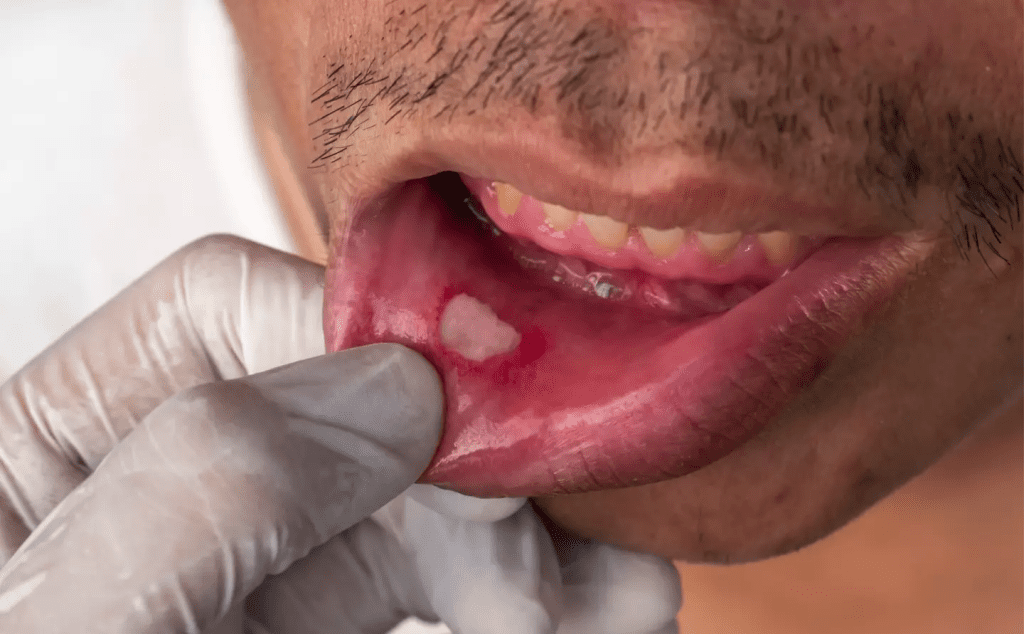As winter sets in, many of us experience common health complaints like dry skin, seasonal colds, or even sore throats. However, some symptoms, like mouth ulcers, may seem harmless but could be a sign of something more serious. A dentist has issued a cautionary message for those suffering from recurring mouth ulcers, warning that a persistent sore in the mouth may indicate oral cancer or other serious health conditions.
Understanding Mouth Ulcers: More Than Just a Winter Woe

Mouth ulcers are painful, round sores that often develop inside the mouth, on the gums, or on the tongue. While they are common and can appear due to a variety of reasons, many people dismiss them as harmless irritations. Dr. Andrej Bozic, an oral surgeon at Dentum, explains that while these ulcers can worsen in winter due to cold weather and dehydration, any ulcer that doesn’t heal within two weeks should not be ignored.
Winter conditions can aggravate mouth ulcers, particularly because colder months often lead to dehydration and a higher risk of infections. But what makes an ulcer different from a regular winter sore? It all comes down to duration and persistent symptoms.
Common Causes of Mouth Ulcers: What You Should Know
Mouth ulcers can result from a variety of causes, and understanding these triggers is key to determining whether a sore is a simple irritation or something more serious. Common causes include:
- Biting the inside of your cheek or accidentally cutting the inside of your mouth.
- Poorly fitted dentures or braces that cause friction against the soft tissues of the mouth.
- Stress or anxiety, which can weaken the immune system and make you more prone to ulcers.
- Hormonal changes, vitamin deficiencies, or certain medications that affect the health of your mouth.
Though mouth ulcers are often triggered by minor issues, they can also be indicative of something more serious if they persist or behave differently than usual. Dr. Bozic emphasizes that an ulcer lasting longer than two weeks should be taken seriously.
Why Persistent Mouth Ulcers Could Be a Red Flag
While many mouth ulcers will heal on their own within 10 to 14 days, ulcers that persist longer could signal a more severe health problem. Oral cancer is one of the primary concerns when an ulcer doesn’t heal within this typical timeframe. In fact, a non-healing ulcer is often one of the earliest signs of oral cancer.
Dr. Bozic advises that any mouth ulcer that lasts more than three weeks or exhibits unusual characteristics should be examined by a healthcare professional. Alongside persistent sores, symptoms like unexplained pain, red or white patches inside the mouth, or swelling in the neck or jaw can indicate more serious conditions, including oral cancer.

Key Symptoms to Watch for: When to Seek Medical Attention
If you’re dealing with a mouth ulcer that just won’t go away, there are several warning signs that suggest you should visit a doctor:
- Ulcer lasts longer than three weeks: Any ulcer that persists beyond the typical healing period of 10 to 14 days should be evaluated by a healthcare professional.
- Changes in size or location: If the ulcer is larger than normal or appears in a different area of your mouth than usual, it could indicate a more serious underlying issue.
- Excessive pain or bleeding: An ulcer that becomes more painful, bleeds, or develops a red or inflamed appearance warrants a check-up.
- Difficulty chewing, swallowing, or speaking: If you experience pain or discomfort while eating, drinking, or talking, this could be a sign of a deeper problem that needs medical attention.
- Lumps or swelling in the neck or jaw: Swelling in these areas, combined with a persistent ulcer, should not be ignored.
The Link Between Mouth Ulcers and Oral Cancer
Oral cancer is a major health risk that often goes undetected until it reaches an advanced stage. Dr. Bozic explains that non-healing ulcers are one of the first signs of this potentially deadly disease. Patients often assume these sores are just minor injuries, but failing to address them can lead to serious consequences.
In addition to ulcers, oral cancer may present other symptoms, such as unexplained pain, difficulty swallowing, or the appearance of unusual lumps or patches in the mouth. If you notice any of these signs alongside a persistent ulcer, it’s crucial to seek professional care as soon as possible.

The Importance of Early Detection and Regular Oral Health Checkups
The earlier oral cancer is detected, the better the chances of successful treatment. Dr. Bozic emphasizes the importance of regular visits to the dentist for routine check-ups, as many oral cancers can be diagnosed early during these appointments. By staying on top of your oral health and seeking prompt treatment for persistent symptoms, you can significantly reduce the risk of serious complications.
In addition to detecting potential cancers, regular dental exams can also help identify issues like gum disease, tooth decay, and other oral conditions that may affect overall health. A dentist’s evaluation of any unusual symptoms, such as mouth ulcers, can be life-saving.
Conclusion: Don’t Ignore the Signs
While it’s common to experience mouth ulcers from time to time, it’s important to be vigilant about persistent or unusual symptoms. What may seem like a minor annoyance can sometimes indicate a more serious condition, such as oral cancer or an autoimmune disorder. If you notice any changes in your mouth that last beyond two weeks, including swelling, unexplained pain, or difficulty chewing, don’t wait for it to go away on its own. Consult a healthcare professional to ensure your health is in good hands.
By staying informed and proactive about your oral health, you can avoid serious consequences and maintain a healthy mouth. So, next time you experience a mouth ulcer, remember: If in doubt, check it out. Your health is worth the attention.


